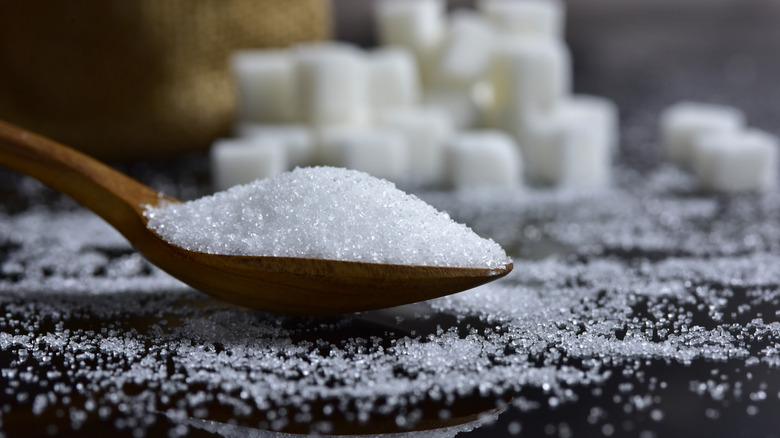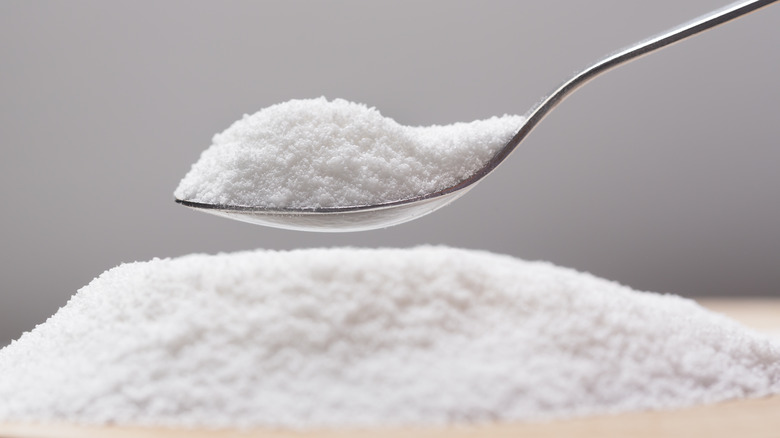9 Reasons To Think Twice Before Using Coffee Creamer Again
For many people, coffee creamer is a must-have pantry staple. This food item seamlessly replicates cream or half-and-half and often includes added flavors to give it a more delicious taste. As a bonus, you can use coffee creamer in loads of ways that don't involve coffee. But all that ease can come at a cost. Coffee creamer is far from the healthiest food item out there, and its texture and flavor are provided by certain ingredients that could have more of an impact than you think.
Some of these ingredients — like corn syrup, sugar, and vegetable oils — make its nutritional makeup distinct from regular dairy products and can raise its fat and sugar content. Certain additions also add a silky-smooth texture, but these ingredients, such as carrageenan, come with their own health considerations. It's not just liquid coffee creamers that have questionable ingredients in them, either: Powdered creamers can often contain solidified versions of these items. These can pose just as much of a concern as liquid creamers. For this article, we focused on breaking down these individual ingredients to discuss how they can contribute to poorer health outcomes, using scientific studies to do so.
1. Coffee creamer has a high sugar content
You may spend your time wondering what the best creamer flavor is, but you may not be thinking about where all that flavor comes from. Many coffee creamers contain a surprising proportion of added sugar in their suggested serving size, which can account for a high percentage of your daily value. In one tablespoon of International Delight Caramel Macchiato Coffee Creamer, for example, there are 5 grams of added sugar per tablespoon serving, accounting for 10% of your recommended daily value of added sugar.
Some health guidances indicate that this amount is an even higher percentage of your recommended daily amount. The American Heart Association, for example, recommends that women consume no more than 25 grams of added sugar per day, meaning that one tablespoon of this coffee creamer would cover approximately 20% of your daily intake. That's if you stick to just one tablespoon of creamer, too — many people put in way more.
Consuming too much sugar can have a serious impact on your health. As well as contributing to a greater risk of high blood pressure, inflammation, and heart disease, it can also advance the risk of poorer mental health outcomes, like anxiety and depression, per a 2016 study published in Neuroscience & Behavioural Reviews. Even small amounts of added sugar can add up, so it's important to keep an eye on your coffee creamer intake.
2. Coffee creamer contains carrageenan, a controversial ingredient
One of the main advantages of coffee creamer is its texture. Liquid coffee creamers have a silky consistency that helps to give bulk to your coffee. These liquid creamers also stay smooth, even at room temperature. This texture, however, is partly created by thickeners and emulsifiers like carrageenan, which can prove more trouble than they're worth.
Carrageenan has long been a controversial ingredient, and its inclusion in many processed foods has caused concern for health professionals due to its potential ability to cause inflammation. Unfortunately, the evidence for this is still incomplete, which has raised worries about its long-term use. Some studies, such as a 2021 one published in Nutrients, have pointed out that several animal trials have seen a link between carrageenan and inflammation, as well as inflammatory bowel disease. But this study also points out how patchy the research is at the moment. The study states that, until more data is available, it's best to limit your exposure to carrageenan as much as possible — which may mean you need to skip the store-bought stuff, and make unbeatable coffee creamer at home instead.
3. Many coffee creamers have corn syrup in them
Ah, corn syrup. Few ingredients have been as controversial as this one, which is partly why so many food manufacturers have removed it from their recipes, instead promising that their products contain natural or cane sugar. Unfortunately, coffee creamers don't make such promises. Corn syrup and corn syrup solids frequently show up in coffee creamers. High-fructose corn syrup, as well, also makes appearances on the ingredient lists of these products.
It's high-fructose corn syrup that's especially worrying. Because high-fructose corn syrup goes via a different metabolic pathway than regular sugar (which is made from sucrose), it has a different impact on the body, creating a higher likelihood of inflammation. A 2022 study published in Frontiers in Nutrition found that eating high-fructose corn syrup is associated with a higher level of c-reactive protein, or CRP, in the body. This protein can be a strong indicator that inflammation is present. As such, it may be better to try and find coffee creamers that use sugar instead of high-fructose corn syrup, or to avoid using coffee creamers entirely.
4. Some creamers may have trans fats
Fats come in many shapes and sizes, and trans fats are pretty much the worst type out there. These fats are known to have a detrimental impact on cholesterol by simultaneously lowering the good type and raising the bad type. The issue, too, is that there are two different types of trans fats, those that come from natural sources and those that are industrially made (which are more harmful). And, as a 2021 study published in the journal Foods points out, it's difficult to tell which is which when it comes to what's in your food.
And guess what? Trans fats are often in coffee creamers, folks, and you may not even realize it. Unfortunately, certain coffee creamers can contain oil types that supply trans fats in low quantities. If they contain less than 0.5 grams of trans fats, though, manufacturers are totally at liberty to round the number of trans fats present down, meaning that you won't know if you're consuming them or not. Luckily, these quantities are so small that if you're only having a drop now and again, it shouldn't be much of a problem. However, if you're drinking loads of coffee creamer, these things can add up, so it's always best to try and consume as little as possible.
5. Coffee creamer isn't necessarily dairy-free
One of the main advantages that coffee creamer has over regular milk or cream is its ability to supply smoothness and richness without dairy. However, somewhat surprisingly, it's not always dairy-free. While many coffee creamers have no dairy in them — and instead get their velvety texture from vegetable oils — certain options, like Great Value French Vanilla Coffee Creamer, contain milk.
Now, this may not be an issue for most people — but for those with dairy allergies, it's a big problem. Around 2-3% of infants have dairy allergies, with some of them retaining them into childhood and adulthood, according to the American College of Allergy, Asthma, & Immunology. Allergic reactions to dairy can be especially dangerous and may result in anaphylaxis, per a 2019 study published in Nutrients, which may be life-threatening.
As such, you should always check if your coffee creamer is dairy-free. This is especially important if you're serving it to kids. Also, don't assume your creamer is dairy-free because it doesn't taste like it. Dairy can be there to contribute texture as much as taste. Bear in mind, though, that opting for dairy-free options may not be super healthy, either, as many dairy-free milk alternatives have more sugar than you think.
6. Coffee creamers may contribute to weight gain and chronic conditions
Coffee creamers, like many foods, are things that you should be consuming fairly moderately, due to their calorie content. Many coffee creamers contain around 35 calories per tablespoon serving. This is a relatively small amount. If you stick to the serving size, this makes up a small amount of your daily caloric intake every day. Consume too much of it, though, and you could be raising your calories a little more than usual.
The cumulative effect of this can be an increase in weight, which may impact your health long-term. Weight gain has been found to contribute to a range of chronic health conditions, like high blood pressure, diabetes, gallstones, heart disease, and cancer, according to research published in Eat for Life: The Food and Nutrition Board's Guide to Reducing Your Risk of Chronic Disease. Having said this, it's of course important not to fully govern your life and diet by calorie intake, and a small amount of coffee creamer daily may not have a huge impact.
7. The fats used in coffee creamer could be unhealthy
Unlike high-fat dairy (like cream), coffee creamer's fat content isn't inherent: it's added. It usually comes in the form of vegetable oil. Unfortunately, the type of vegetable oil used may not always be the healthiest. Soybean oil is commonly used in coffee creamer. This is as useful for its fat content — which helps make the creamer creamy — as it is for its neutral flavor. However, it's one of the unhealthiest oils to cook with and has been noted for its potential impacts on multiple areas of health, including gut health.
Soybean oil is particularly impactful on the intestinal system. A 2023 study published in Gut Microbes found that consuming higher levels of soybean oil may alter your microbiome and increase your risk of colitis. This oil also has a notable impact on your susceptibility to diabetes, according to a 2015 study published in PLoS One. The same study also found that high consumption of soybean oil may contribute to a higher risk of liver injury.
8. Coffee creamers have a low vitamin and mineral content
Because coffee creamer is used in such small quantities, it may not seem like a big deal that it doesn't have many vitamins or minerals. However, every little helps — and swapping your regular milk for coffee creamer may leave you lacking essential nutrients. Many coffee creamers don't bother putting any vitamin or mineral information on their nutritional labels, simply because there just isn't much there. Indeed, Nestlé Coffee Mate Coconut Creme Liquid Coffee Creamer points out that vitamins and minerals are lacking, stating that it's "not a significant source" of several nutrients like vitamin D or calcium.
Milk, on the other hand, is pretty nutrient-rich, thanks to being fortified. Vitamin D is frequently added to cow's milk in the United States, with these milks also commonly fortified with calcium. Losing out on these nutrients can have a big impact. Both vitamin D and calcium contribute to good bone health. Vitamin D also bolsters your immune system, per a 2008 study published in Current Rheumatology Reports. If you know you get adequate levels of vitamin D and calcium elsewhere in your diet, you may not miss it from the milk in your morning coffee. If you don't, however, you may need to consider how your coffee creamer fix may be affecting this.
9. The artificial sweeteners in creamers might affect your gut
The amount of sugar in many coffee creamers can put people off and cause some folks to seek sugar-free coffee creamers. However, while these creamers may look good from a nutritional perspective, the way that they achieve their sweetness can be a little worrying. Great Value Sugar-Free Coffee Creamer, for example, gets its sweet flavor from maltodextrin and sucralose. These artificial sweeteners may be low-calorie — and make some of the best sugar-free candies out there — but they can also have a surprising impact on gut health and sugar sensitivity.
Maltodextrin can be especially disruptive to gut health. A 2015 study published in Gut Microbes found that consuming maltodextrin can raise the levels of unhealthy bacteria in the gut, while also altering your good bacteria levels. This bacterial alteration can have a knock-on effect on your inflammation levels and may increase your risk of inflammatory bowel disease. Eating sucralose, meanwhile, can alter how sensitive your body is to glucose, according to 2020 research published in Cell Metabolism. This means that eating sucralose alongside other carbs can disrupt how your body works through the latter, and may result in an overall imbalance of how you process food.
Methodology
When determining why you should think twice before using coffee creamer, we first looked at individual ingredients or aspects of the food that could be considered unhealthy. Coffee creamers are classified as ultra-processed foods, which are defined as such — not just because they have added sugar or fat — but because they contain additional ingredients like flavorings, thickeners, and emulsifiers. Consuming ultra-processed foods regularly can contribute to poorer health outcomes. These foods, when eaten in greater quantities, can impact your cardiovascular system, mental health, and risk of mortality, according to a 2024 study published in The BMJ.
We wanted to look beyond the fact that coffee creamers are ultra-processed and examine exactly how each ingredient can affect health individually. As such, we looked at the ingredients typically included in coffee creamers in more detail, as well as scientific studies that assessed how these ingredients may impact the body. It's important to remember that drinking coffee creamer occasionally, or once or twice, will likely not significantly affect your health. However, it's equally important to be aware of how regular, high consumption of this humble food could have an influence in the long term, especially when combined with a less nutritious diet.










